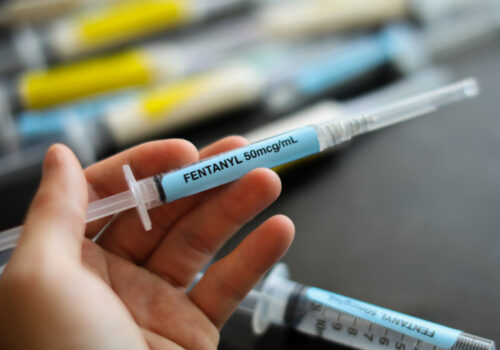How Congress can thwart the flow of fentanyl using economic statecraft
More than 74,000 people in the United States died from synthetic opioids such as fentanyl last year. That is the equivalent of a large commercial airliner crashing and killing all of its passengers each and every day of the year. It is also a stark increase from the 3,100 deaths per year a decade earlier.
Given the atrocious impact of the fentanyl crisis on Americans, Congress is examining ways to halt or hinder the flow of fentanyl into the United States, particularly from China. In April, the Select Committee on the Strategic Competition Between the United States and the Chinese Communist Party (the Select Committee) found that Chinese companies produce virtually all fentanyl precursors used to produce illicit fentanyl worldwide. This near monopoly on producing this deadly drug owes to grants and tax rebates the government of China awards to companies involved in the manufacturing and export of fentanyl materials and other synthetic narcotics.
To address this crisis, the Select Committee has proposed several tools to combat the flow of fentanyl into the United States, including the establishment of a Counter Opioid Joint Task Force, trade and customs enforcement measures, and prioritizing fentanyl programs in domestic and international law enforcement and intelligence efforts. But another tool is needed as well: economic statecraft. In particular, the United States could use sanctions to target entities involved in the fentanyl trade.
My previous roles as director of international economic affairs at the National Security Council and deputy coordinator for sanctions policy at the Department of State put me at the heart of US economic statecraft. More recently, I have worked with industry to implement and comply with numerous sanctions programs. Based on this experience, I believe that sanctions are an effective tool to isolate and frustrate the bad actors trying to profit from the fentanyl crisis in the United States, and could be used even more effectively to stem the flow of the drug into the United Sttates. The use of sanctions can make a real difference in denying traffickers the financial resources and support they need to run their illegal businesses. History has demonstrated how sanctions programs like these can strangle access to financing for bad actors.
The effectiveness of sanctions to restrict financing for nefarious traffickers has been well demonstrated in the fight against terrorist financing. Mere weeks after the September 11, 2001, attacks, then President George W. Bush issued Executive Order 13224, which authorized sanctions on people who commit acts of terrorism and on those providing financial support to those terrorists. In the more than twenty years since, the Office of Foreign Assets Control (OFAC) has used this authority to impose sanctions on the financiers of terrorism and throttle the flow of resources to al-Qaeda, the Islamic State of Iraq and al-Sham, Hamas, Hezbollah, and other terrorist groups. Recently, OFAC has used this authority to restrict Hamas’s access to financing through the use of cryptocurrency and other channels. In January of this year, OFAC sanctioned thirteen individuals and entities for running two separate money laundering networks supporting Hamas. OFAC’s actions represent part of a coordinated effort targeting Hamas financing since the attacks on Israel of October 7, 2023.
Similarly, sanctions can and should be used to cut off funding to fentanyl traffickers and their money men. OFAC has already begun. Not only has the agency sanctioned fentanyl trafficking rings, it has sanctioned individuals and entities involved in various stages, including suppliers, money launderers, and laboratory operators affiliated with those traffickers. In all, since 2018, OFAC has designated 108 individuals and seventy-one entities linked to fentanyl smuggling rings.
Now is not the time to let up. The incoming Congress should take several steps to support and escalate these efforts to strangle fentanyl financing.
1. Don’t just codify sanctions authorities, but regularize their use
Codifying Executive Order 14059, the tool OFAC uses to sanction those involved in fentanyl would constitute an important congressional endorsement of the administration’s use of sanctions. It would not by itself, though, expand or strengthen any of the administration’s available tools. While Congress has codified numerous executive orders related to sanctions, it largely failed to change the administration’s policy or practices unless coupled with a requirement for reporting and regular updates to the sanctions lists. Congress should codify Executive Order 14059 and pair it with a biannual requirement to update the list of sanctions targets.
Congress has codified numerous sanctions authorities issued by the president, including making some of those sanctions mandatory. For example, in 2017 President Donald Trump signed into law the Countering America’s Adversaries Through Sanctions Act, which codified the Russia sanctions program established in various executive orders. In the North Korea Sanctions and Policy Enhancement Act of 2016, Congress modified the sanctions authorities for North Korean weapons of mass destruction programs from discretionary to mandatory. The Ukraine Freedom Support Act of 2014 codified any executive order addressing the crisis in Ukraine, the Hezbollah International Financing Prevention Amendments Act of 2018 codified sanctions against Hezbollah, and the Iran Threat Reduction and Syria Human Rights Act of 2012 codified nonproliferation and terrorism executive orders. Yet none of these actions seem to have materially changed each administration’s approach to sanctions.
Congress has found greater success, however, when it paired sanctions with a requirement for the administration to regularly update a sanctions list. In the Comprehensive Iran Sanctions, Accountability, and Divestment Act of 2011, Congress required the Obama administration to impose sanctions on Iranians responsible for human rights abuses. The statute required the administration to submit an updated list of sanctioned individuals to congressional committees every six months. The statute provided not only a political endorsement of the sanctions, but also a nudge to the administration every six months to convene a process to consider sanctions targets and to prioritize the resources to impose sanctions. In my experience, the added reporting requirement made a material difference in the administration’s response to the legislation. Congress should do the same with respect to the fentanyl sanctions and require regular updates from the administration to the list of sanctions targets.
2. Increase resources for the implementation and enforcement of sanctions
Congress should support the administration’s ability to implement and enforce sanctions by providing more resources to ensure the sanctions on fentanyl networks are actually effective. Earlier this year, I co-authored an article arguing that Congress should provide additional resources to OFAC to improve not just the imposition of sanctions, but also their implementation and enforcement. As I noted in that article, OFAC administers thirty-seven different economic sanctions programs with only a few hundred employees. “OFAC has a nearly unparalleled national security mandate with oversight of the US economy and many other facets of global economic activities,” Alex Zerden and I explained. It is unrealistic, then, to expect OFAC to continually do more with the same resources. In that article, I recommended that Congress provide budgetary resources for OFAC to prioritize the hiring of legal and prosecutorial experience to better enforce the sanctions. Congress should grant the Treasury Department enforcement capabilities on par with other civil regulatory agencies.
3. Allow victims of fentanyl crimes to seize blocked funds from perpetrators
Congress could enact legislation to provide a private right of actions to the family members of those who have suffered the deadly consequences of fentanyl trafficking. The measure would allow family members to seize and secure the assets of criminal groups and their supporters, including assets that have been blocked due to sanctions. Again, this is not without precedent. The Anti-Terrorism Act of 1990 created a federal right of action for US nationals “injured in his or her person, property, or business by reason of an act of international terrorism.” The Anti-Terrorism Act has enabled more than 150 lawsuits against organizations including Hamas, Hezbollah, the Revolutionary Armed Forces of Colombia, and their supporters. The rights of action created under this legislation have resulted in billions of dollars of damages being awarded to the families of victims of terrorism. Congress could create a similar right of action to allow the families of US victims of fentanyl trafficking to seek compensation from the blocked funds of groups targeted by OFAC and seek some compensation for the great harm they have suffered.
4. Increase data collection and information-sharing practices
Congress should take steps to promote information sharing between financial institutions, agencies involved in responding to the fentanyl crisis, and international partners. The Financial Crimes Enforcement Network (FinCEN), which enforces anti-money laundering regulations, released an advisory in June 2024 emphasizing the need for financial institutions to report illicit or suspicious activity related to fentanyl, and to provide specific red flags that financial institutions should monitor related to fentanyl. The advisory highlights the need for information sharing among stakeholders—not only have evasion techniques been highlighted by OFAC in its designations, but FinCEN’s advisory flags financial typologies related to fentanyl production which can help identify sanctions targets. This is important not only among agencies such as the Department of Justice and Department of the Treasury, but also with foreign partners. A key element of this information-sharing process is with financial institutions, as emphasized by the FinCEN advisory and the role that this information has played in identifying sanctions targets.
As Congress is well aware, the fentanyl crisis, and the flow of fentanyl from China specifically, must be addressed using many of the United States’ and local governments’ tools. Economic statecraft should be among that tool set and offers several promising options to make it more difficult, expensive, and dangerous for fentanyl traffickers to ply their trade.
David Mortlock is a nonresident senior fellow at the Atlantic Council and a partner at Willkie Farr & Gallagher LLP. The author thanks Josh Nelson for his help in preparing this piece.
Further reading
Thu, Oct 31, 2024
Financial sanctions can disrupt fentanyl flows to the United States
Econographics By
Fentanyl is one of the leading causes of death among young and middle-aged Americans. Financial sanctions should be used more frequently by the US government to tactically disrupt the trade of fentanyl and other illicit drugs.
Fri, Nov 22, 2024
Sanctions expectations in a second Trump administration
Econographics By Daniel Tannebaum
Sanctions are poised to remain a cornerstone of US foreign policy under a second Trump administration. With a focus on Iran, Russia, and potentially China, Trump's team may lean on tools like secondary sanctions while navigating a tense geopolitical environment.
Thu, Sep 26, 2024
US Ambassador to China Nicholas Burns: The US has managed to ‘stabilize’ its relationship with China
Transcript By
Burns spoke at the Transatlantic Forum on GeoEconomics, where he explained how the US-China relationship has evolved since the beginning of the Biden administration.
Image: Port St. Lucie police announced Wednesday, July 19, 2023, that they seized 10,000 fentanyl pills worth $300,000 and a pound of cocaine in the city's largest drug bust to date.


